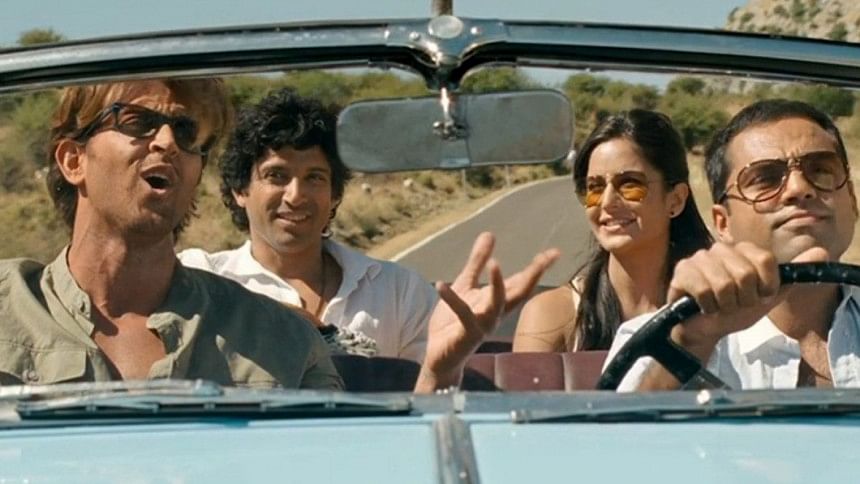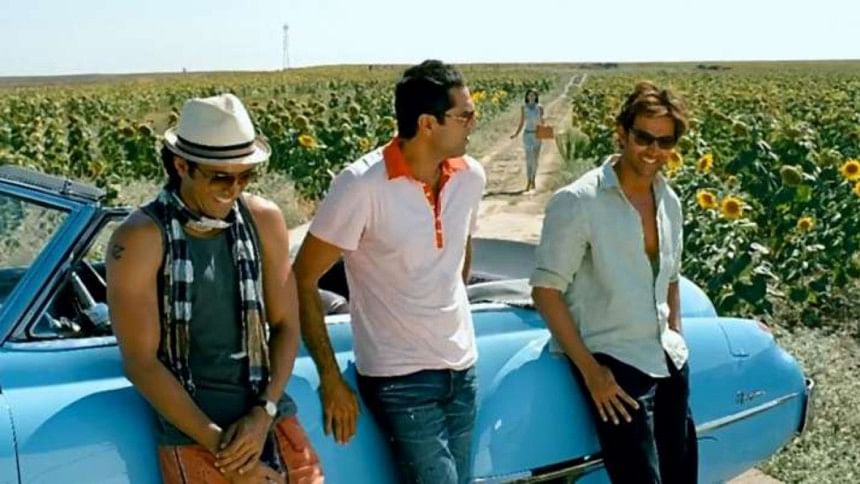12 Years of ‘Zindagi Na Milegi Dobara’

It has been twelve years since Zoya Akhtar's magnum opus, "Zindagi Na Milegi Dobara," hit the silver screen, and this coming-of-age film took audiences on an exhilarating journey that explored friendship, love, self-discovery, and the true essence of living life to the fullest.

Set against the picturesque backdrop of Spain, "Zindagi Na Milegi Dobara" weaves a tale of three childhood friends Arjun (Hrithik Roshan), Imraan (Farhan Akhtar), and Kabir (Abhay Deol), who embark on a road trip to celebrate Kabir's bachelor party. What seems like a typical trip filled with adventure soon transforms into a transformative experience that challenges their perceptions, fears, and relationships. The film brilliantly captures the essence of the human spirit and its constant struggle between responsibility and freedom.
One of the film's greatest strengths lies in its meticulous character development. Arjun's journey from a work-obsessed professional to a man who learns to appreciate life's simple pleasures is a testament to Hrithik Roshan's nuanced performance. Farhan Akhtar's portrayal of Imraan, a carefree poet grappling with his identity, is poignant and relatable.

Abhay Deol's Kabir represents the struggle between societal expectations and personal desires, portrayed with subtlety and depth. These characters resonate with audiences as they embody the conflicts and aspirations that many individuals experience in their own lives.
The screenplay, penned by Zoya Akhtar and Reema Kagti, strikes a delicate balance between light-hearted banter and profound conversations, allowing the audience to connect with the characters on multiple levels.
Zoya Akhtar's direction is laudable as she masterfully weaves together various narrative threads. She captures the essence of each character's emotional journey, carefully crafting moments of vulnerability, joy, and self-realization. Akhtar's attention to detail and her ability to elicit authentic performances from the cast contribute to the film's overall impact.
The cinematography by Carlos Catalan is a visual treat. From the sun-kissed landscapes to the azure waters, each frame is a work of art. Catalan skillfully captures the vibrant energy of Spain, making it an integral part of the storytelling. The breathtaking shots of the La Tomatina festival and the mesmerizing underwater sequences during scuba diving immerse the audience in the characters' experiences, evoking a sense of awe and wonder.
The film's soul-stirring music, composed by Shankar-Ehsaan-Loy, further elevates the storytelling. From the heartwarming poetry of "Toh Zinda Ho Tum" to the foot-tapping beats of "Senorita," the soundtrack becomes an integral part of the narrative, evoking emotions and enriching the cinematic experience.
The songs seamlessly blend into the storytelling, enhancing the mood and evoking a range of emotions. The soulful melodies, such as "Khaabon Ke Parindey" and "Ik Junoon," beautifully complement the characters' journeys. The film's soundtrack is a testament to the power of music in conveying emotions and adding layers to the storytelling.
While "Zindagi Na Milegi Dobara" was appreciated by a global audience, it did face criticism regarding its lack of relatability for the Indian audience. The film's portrayal of the affluent urban lifestyle and the characters' privileged backgrounds were deemed distant from the everyday reality of the average Indian. Some argued that the film catered more to an elite, cosmopolitan audience, which limited its broader appeal within the country.
However, it is important to acknowledge that cinema, like any art form, has the capacity to transcend boundaries and depict diverse stories. While the characters' lifestyles may not mirror the majority of Indian society, their emotions, conflicts, and search for personal fulfillment strike a universal chord. "Zindagi Na Milegi Dobara" encourages viewers to reflect on their own aspirations, relationships, and the pursuit of happiness.
As we celebrate its 12th anniversary, may its message of living life to the fullest resonate with us all, urging us to embrace every moment and truly seize the day.

 For all latest news, follow The Daily Star's Google News channel.
For all latest news, follow The Daily Star's Google News channel. 









Comments